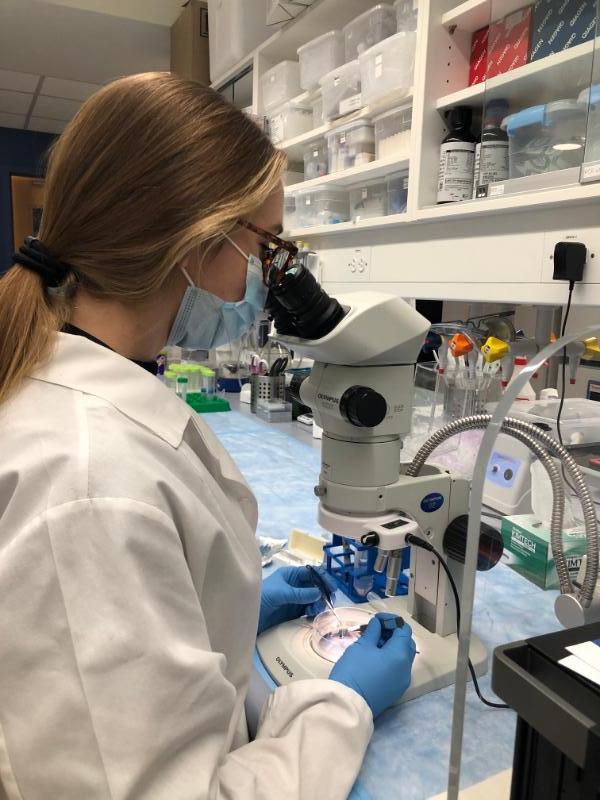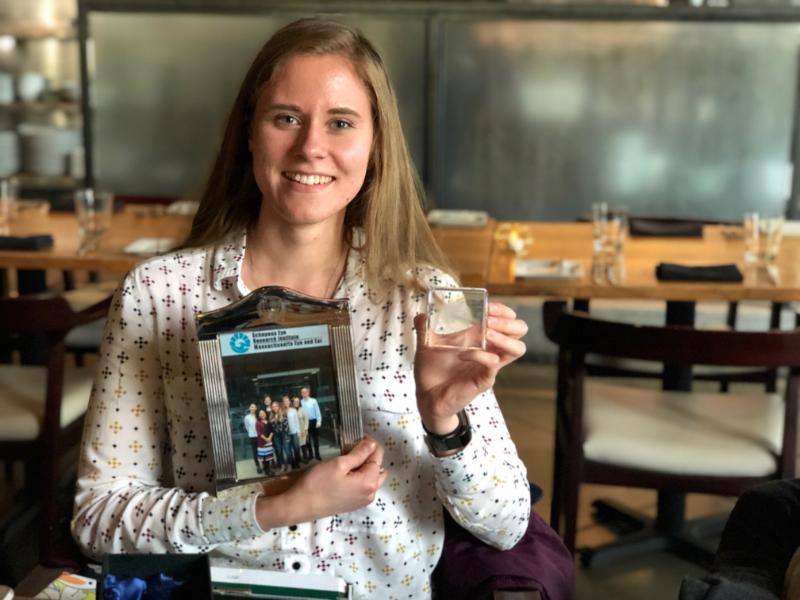Recent Earlham College graduates Kate Korobkina and Emma Hoffmann are co-authors in a pioneering study led by Harvard Medical School scientists that reversed age-related vision loss and eye damage from glaucoma in mice.
The study was published in the major scientific journal Nature earlier this month and demonstrates that it may be possible to safely restore the nerve cells of the eye to an earlier age.
“This paper is extremely inspiring and will have a major contribution to the fields of ophthalmology and aging,” said Korobkina, a 2016 Earlham graduate who worked for three years as a research technician on this project and others at the Schepens Eye Research Institute of Massachusetts Eye and Ear. Schepens is an affiliate of Harvard Medical School.
“It was great to be a part of such a big collaboration, during which I continued to learn how to plan and design experiments, have the right controls, acquire and process samples, and analyze and interpret the results,” she said. “I am looking forward to the day of having my own first-author publication.”
Korobkina and Hoffmann are among the latest Earlham graduates hired as interns or research technicians in the labs of Bruce Ksander and Meredith Gregory-Ksander, who were principal investigators on the research. Since 2005, 15 Earlhamites have benefitted from important professional experience and career-discerning activities in their lab while contributing to the advancement of science.


“Critical in why it’s worked so well, is that Earlham faculty have always picked out students that would be the best fit,” said Bruce Ksander, an associate professor of ophthalmology at Harvard Medical School and the co-director of the Ocular Oncology Center of Excellence. “We’ve never had to screen these students. Earlham always has recommended a slew of terrific, talented students to work with us. They are all mature and motivated to succeed.”
Both Korobkina and Hoffmann were tasked with running a series of assays, or investigative procedures, that scored the visual acuity of mice used in the study. They also were required to give regular presentations of the data they generated.
“They both put in a lot of effort and played an intellectual role in putting the paper and the data together,” said Gregory-Ksander, an assistant professor of ophthalmology at Harvard Medical School and an associate scientist at Schepens. “The techniques in our laboratory are very hard to learn. Our technicians have an opportunity to learn and truly participate in the research. When they actually know what the assay means, they are connected and a lot more excited about the work.”
Korobkina is currently a second-year Ph.D. student at the Graduate School of Biomedical Sciences at the University of Massachusetts Medical School. Hoffman is continuing work on the project as a research technician and plans to apply to medical school in early 2021.
“Wrapping my head around the enormity of this project and explaining this project to my friends and family is hard to do, but the impact that it can have on the future of research and medicine is really big,” said Hoffman, who graduated from Earlham in 2018. “Now we’re extending this project to see if it has the potential to work in different cell types in the eye, or if this can be successful in other parts of the body.
“This could lead to so many different treatments and discoveries,” she said. “Obviously, there’s a ton we don’t know and still need to learn. That part is also exciting.”
Korobkina and Hoffman both earned degrees in biochemistry from Earlham and participated in undergraduate research before graduating. Korobkina participated in job-shadowing experiences at the Whitewater Eye Center of Richmond and Reid Health and was selected for Earlham-funded internships at Richard M. Fairbanks School of Public Health and the Herman B. Wells Center for Pediatric Research at Indiana University School of Medicine. Hoffmann volunteered at Reid Health in Richmond and was an intern at the Eye Center of Indiana, which included experiences observing surgical procedures.
“I felt prepared to do the work I’m doing today,” Hoffmann said, about joining Schepens in the summer of 2018.
“Bruce and Meredith have continuously had Earlham students throughout the years and I think that says a lot about the kinds of graduates that Earlham produces,” she said. “The fact that Bruce and Meredith keep coming back means they have trust in the school. They know they are going to get a candidate that is prepared and can be successful in their lab.”
Media contact
Brian Zimmerman
Director of media relations
Email: [email protected]
Phone: 765.983.1256